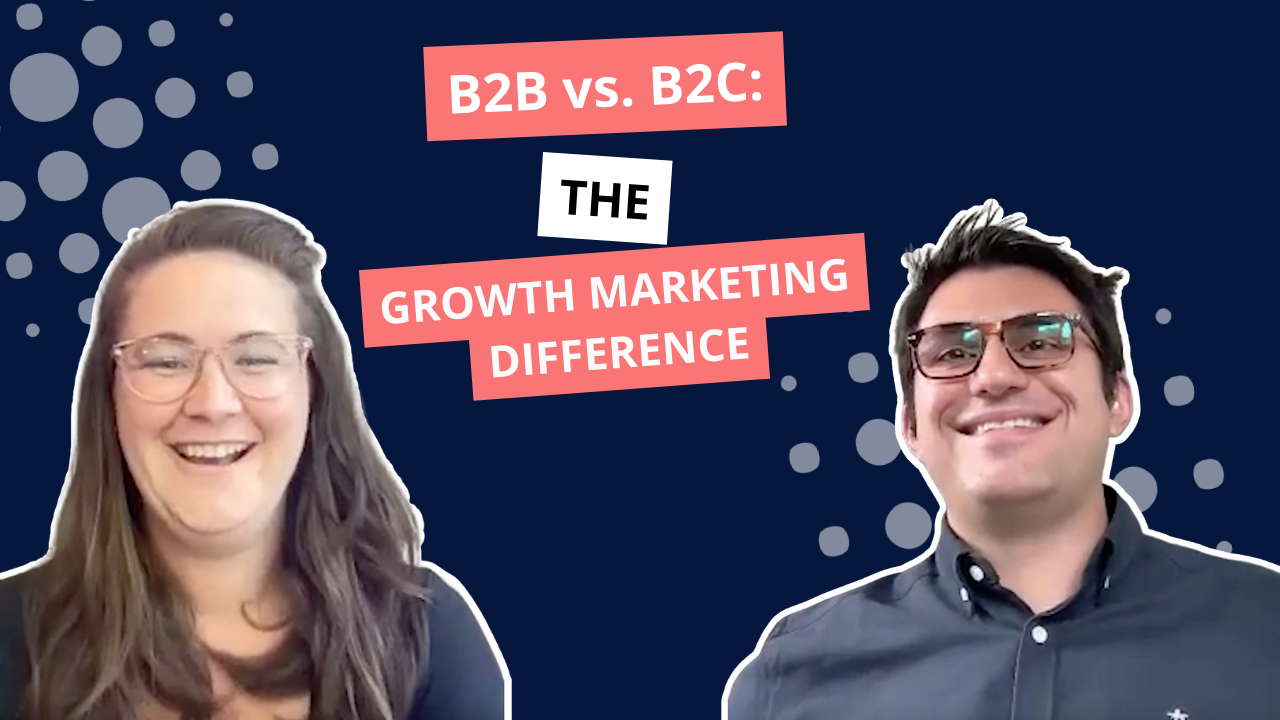Just keep it simple.
So says Ari Kahn, CEO of Bridgeline Digital, when asked what advice he’d give to entrepreneurs just starting out.
In the latest Growth Marketing Chat, Kahn dives into his experience with artificial intelligence, mergers & acquisitions, and crafting a strong company message. He ties it all into how to succeed as an entrepreneur and marketer at any phase of your career.
While having a deep understanding of your audience, employees, and product, keeping things simple, prioritizing one-on-one interactions, and staying decisive and empathetic can help set leaders on the right path.
“...Your customers are gonna interact with different people within [your] organization. They get very confused and very nervous if they're hearing different things from different people... And from a personal perspective, you have people that go home every day to their families. And when they wake up the next morning and come back into the office, they have to feel like they're part of something...” -Ari Kahn, CEO of Bridgeline Digital
Growth Marketing: How to Keep it Simple
Join Kahn as he details the importance of a clear growth marketing message and pulls from his extensive background to reveal:
- How to succeed through mergers and acquisitions
- The importance of organic growth AND inorganic growth
- Where AI fits into marketing
- The only thing you should be worrying about when it comes to online growth
- Why the customer base is a company’s greatest asset
- And much more...
Watch the full interview for expert tips on how to become a leader who is decisive, articulate, and likely to succeed.
Video Transcript:
NICK: All right. Welcome everybody today. We have a very exciting guest Ari Kahn president and CEO of Bridgeline digital. Bridgeline Digital helps customers maximize the performance of their complete digital experience from websites and intranets to online stores and marketing campaigns. Ari, welcome to Growth Marketing Chat.
ARI: Thank you, Nick. Nice to be here.
NICK: Thank you for joining us. You know, maybe we can open up and talk about your journey through entrepreneurship and growth. You've kind of dabbled in a lot of different things. Computers, mathematics founding multiple companies. So I'm very excited to share all about it.
ARI: Okay, great. Well, thank you. I've got my heart in engineering, I have a PhD in artificial intelligence and after I finished my thesis, I started a company called Fat Wire and it was one of the first marketing technology companies. It was one of the first web content management businesses that was in 1996. We built that company to seven or 8 million in revenue by 2000, purely off of a couple of credit cards and a lot of hard work. We didn't know anything about venture capital or raising money, just did it the old fashioned way. And in 2000 when the tech bubble was really at its height and the phone calls from venture capitalists were nonstop. We did a $10 million capital raise just in time for the market to explode.com bubble burst. So we were lucky we had $10 million in cash, and we didn't know how to spend money and pets.com and all these guys were trying to figure out how to cut their spending.
And at that point I learned a lot about international business and mergers and acquisitions. We bought some companies there, most notably open market, which I believe at one point had a market cap of close to 2 billion and bought it for less than 10 million. And that launched that wire into 13 or 14 different countries, ultimately fat wire grew to to be over $40 million in revenue. And we sold it to Oracle for 160 after we sold fat wire. I took some time off one way or another. I ended up down in Belize, beautiful country. I started a company called great land holdings, completely different type of business was building condos and houses and restaurants and lakes and infrastructure and roads and all this great stuff. So physical asset based company selling selling real estate internationally.
That was great. We did a lot of things that I'm very proud of. And in 2015 as I was starting to become more and more involved in technology again, I saw I saw fat wa or I saw Bridgeline at an investor conference, and I saw Bridgeline as a di a roll up of digital agencies that had an identity crisis. It was making transformation to be a software company. And interestingly, it was transforming into a web content management company, very similar to fat wire, but that's a difficult transition. Culturally it's different. The business model is very different. The way you interact with customers is different. And like a typical guy with zero accountability. I sat in the audience leaned over to the guy next to me. Oh, I was one of the founders of this, of the web content management space. I could fix that company.
Went home, slept like a baby phone, started ringing nonstop, all right, get involved, get involved. I invested in the company, it was my first public company. And after investing for about a year and doing a little bit of consulting, I came in as the CEO and you know, since I started web content management back in the nineties, one of the things that I knew pretty well was that Ridgeline was gonna be very late to the party on web content management. I mean, we're talking 20 years different paradigm. So yeah, things were established. It was time to do something different. And I was able to recognize that web content management itself had matured with multiple different types of technologies that were involved and that Bridgeline would be best suited to focus instead of on the platform core part of web content management, which it was going in that direction to focus at a higher level at an app level.
And by making this type of pivot, by seeing that, you know, you, you just can't walk in the door without huge capitalization and fight against 20 year old companies that are well established, but you can turn them into partners. We're able to make huge impact with with, with Bridgeline, deliver tremendous value for our customers and create a business that has growth two separate models. And both of them are important, especially in the capital markets. You need organic growth. You need to fundamentally be able to just sell your own products, your own software, and grow all by yourself. But also, especially for public companies, you need inorganic growth. And this means that you need to have the capability and a model to creatively inject capital, do acquisitions and other inorganic activities that give you a level of growth beyond what the market by itself could deliver. And that's what we're doing today at Bridgeline.
NICK: Wow. That's that sounds really interesting. Can you talk a little bit more about the inorganic growth acquisitions, are you guys currently kind of pursuing acquisitions or and do you consider partnerships as part of that inorganic growth?
ARI: Well, partnership are inorganic growth, but they're very different than the than M and a than acquisitions. So fat wire we're very acquisitive and it, it, so fundamentally, it's important to recognize whether you can do accretive acquisitions and that's the key are you going to, is it going to be one plus one equals three, or are you just bolting a bunch of rocks together to see if they'll float? And unfortunately, a lot of people just bolt things together outta desperation. So you need to have a strategy where, you know, for sure that by bringing another company together, you're adding value. And the key way to add value is to accelerate the inorganic or sorry, the organic component to your growth. So when we buy companies, we buy companies, not just for the technology, that's super important, but also for the customer base, the most efficient way to have organic growth is to be able to expand within your own customers. So if we buy a business, we know that its customers are likely to want our other products, so we can expand to the value of those customers. And we'll also know that our customers are likely to want that product and that the market is able to buy that product as well. So that is, I think the most important aspect to an M and a strategy. Are you getting more than just the technology? Are you also getting a customer base that you can expand in?
NICK: Yeah. in, in our world, you know, we're an agency and, and when an agency M and a, the people are kind of the biggest assets and right next to the, the, you know, the contracts and, and the customers how do you evaluate the, the human resource when looking at acquisitions?
ARI: Yeah. That's very tricky because you have to be quiet during an acquisition. You just can't run around the halls, mean to everybody. But especially in climates like today where it's so competitive to find talent that's pretty critical. So we'll generally look at the tenure salaries, physical location, titles of the people will ask the senior management. That's part of the M and a process, the same question from different angles and to different people about the team itself. But you're taking a bit of a gamble there. And a lot of it will be based on the reputation of the agency, for example. So when you're looking at agencies, you know, who their customers are, the customers only lasting for six months, or are they there for years? That's an indication that the people are very good. Are the people coming and going as a revolving door, are they staying for a long time? If it's a successful agency and the people have been there for a while, they're the ones that made it successful. And those are the guys that you want, but Nick, you're on to a very good point. The most delicate part of due diligence is figuring out who the people are that you're gonna get.
NICK: Yeah. And, you know, I've been on the other side of the, the looking glass and, and Ben help helping clients through transitions and acquisitions and mergers. And I, I think that those first six to 18 months are, are critical for the success of the acquisition. What are some of the principles that have worked for you in those initial kind of initial months, the initial year and a half to really create that new entity?
ARI: Yeah. You know, one of the most simple things that is the best practice always do. It is one on ones. Now you're buying a larger company with 500 people. It would be hard for the CEO to schedule one on one with each of those 500 people, but at a smaller scale, or if you have a larger company with the top levels that you're going to interact with right out of the gate, schedule one on one meetings make 'em happen quickly. Second, your changes have to happen in the first hundred days. Everyone will just fall into patterns and continue doing things the same way they always did after a period of time. And a hundred is a nice round number. So you've gotta be decisive. Try to get the plan together before you announced the acquisition in the first place, provide great clarity to everybody as to what the expectations are and how things will change and have one on one relationships with everyone so that you can build trust, get a sense for who they really are and what their values are.
And, you know, values is another important part, you do need to establish some combined values between the two businesses, but you need to also come in. If you're the acquirer with clarity as to what your mission your values are. And to set that tone, you know, values are not necessarily right or wrong. And you may have a disconnect in terms of focus on acquiring new customers or expanding existing customers. The way that you hand hold a customer through a new engagement, different things. And if the teams aren't on the same page, sometimes people just don't work out because they're set in a particular, you know, a particular style and it's not wrong, but it's not consistent. You can only really get that through one on one interactions as well.
NICK: Yeah. Critical you know, Ari, you've had a long career, different sectors and you've had success in different verticals. What are some of the universal skills that you think are applicable for, for entrepreneurs starting out? What are some of the most important things that you have to teach yourself?
ARI: You know, one of the things that I think is really important, not just in terms of leadership of a team, but also leadership of a market segment is to simplify things. Mm, the world is complex enough all by itself. And if you walk in and you're throwing in everything and the kitchen sink, and you're, you know, bringing in all of these very complicated details, it's very difficult to step back, try to figure out the one, two or three most important components of a project, of a mission of of, of a new product launch and to boil it down and articulate that message. Clearly your team members will be able to understand what their role is, what their long term mission is. Your customers will know where you fit and where you don't, and you won't get lost in the minutia of all of these details.
So that it's hard, right? I love a quote from it's attributed to a lot of different people, but I'll use mark Twain. I would've wrote a shorter letter if I had more time true. It's hard to simplify things. It's hard to boil it down. And in fact, the value proposition that we're doing at built at Bridgeline is all about simplifying the com complexity of online growth for eCommerce growth is the most important aspect of the the most important role of the VP of, of marketing. However, they're inundated with all sorts of messages, you should increase traffic, and you should a ton of different things. We boil that down to, we help you grow, and then they're gonna say, well, how, and we keep it very simple. We can increase your traffic. We can increase the conversion of that traffic into buyers, and we can increase the amount each one of those by, and we keep it just down to that. All of our products fall into one of those three categories, and the customer's able to recognize whether we're the right fit for them or not, and make a decision. The worst thing is spending six months on a sales cycle, just to figure out that there was, there was never a deal in the first place to keep it simple.
NICK: That's, that's great advice. And I think I, I definitely agree with the focus on, on messaging, both internal and external you know, know a lot of people focus of course, on external messaging and, and the, how that messaging fits to the, the customer base. But they forget that internal messaging is almost just as important and the two have to be aligned.
ARI: Right? I mean, you've got a large organization, your customers are gonna interact with different people within the organization. They get very confused and very nervous if they're hearing different things from different people, you've got large initiatives with dozens of people on them. And if they're not moved in the same direction, that initiative just spins around and is never finished. And from a personal perspective, you have people that go home every day to their families. And when they wake up the next morning and come back into the office, they have to feel like they're part of something and not a one off going in one direction. And no one's quite with them, but they don't know which way to go. And, you know, that pulls a lot of emotional energy outta your team. And how are you really gonna succeed? Especially if you wanna be an entrepreneurial company that is taking chances and doing big things, if people aren't in their body and soul.
NICK: Absolutely. Absolutely. You mentioned a little bit about Bridgeline and, and how you, how you guys essentially serves the, serve, the market, your, your target customers. My understanding is that the leaders of marketing what do you think is currently missing from from their toolbox what, what are kind of marketing leaders missing and what should I be thinking about more as we kind of get into like the third decade of the millennium.
ARI: You know, AI is becoming incredibly important and it's a real thing, right? I mean, my background is an artificial intelligence and I have to admit back in the nineties, when I started my PhD, we all joked like, oh God, this stuff is a hundred years away. <Laugh> a lot quicker. It still has a long way to go. But for marketers, for our customers, VP of marketing, they need to be able to experiment with different techniques to see which ones work, track, which ones are working and which ones aren't working. And there are literally thousands of different types of campaigns and technologies that they could use at any point, what they need is they need to have a system in the background that can evaluate all of these thousands of different opportunities, track, which ones have been working. Haven't been working for them and provide intelligent recommendations as to what to try. Next marketing still is an art. It always will be, but it's increasingly analytical. And it's got so many variables that a person can't do the analysis, but a neural network or some other learning algorithm in the background that is watching the the, the, the very small nuances that are required to be competitive. I mean, is the purchase button gray or blue? It could make a big difference. Track of all that stuff you need help, you need a machine.
NICK: Absolutely. well, I, I feel like, like we could talk about this stuff all day. You you're like a founded of knowledge. It's, it's, it's been a pleasure. Unfortunately, we have to wrap up, can you leave us with one kind of actionable tip or, or, or some kind of a tactical recommendation that our customers who are, you know, VPs of marketing CMOs directors of marketing can implement in the next week, the next month?
ARI: Sure. For online growth, think in terms of your revenue, don't be confused by all the hundreds of different messages you're getting, it's all about revenue at the end of the day. That's what your board and that's what your CEO needs to see and needs to happen in a timeframe in which their business plan executes. If you're spending money on something, that's not going to deliver revenue in the near term, make sure that your CEO's on board with it and recognizes it as a strategic investment.
NICK: Yeah. And if I, if I may add, if you're not sure whether it's impacting revenue or not, your analytics and tracking an order.
ARI: Exactly. There's a, there's a saying for businesses, there's two types of problems, revenue and everything.
NICK: That's a one. So it's been a real pleasure. And thank you for joining us.






